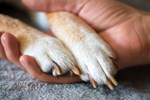New study reveals flat faced dogs have the highest risk when giving birth
Any female giving birth can be affected by difficulties, and this applies to dogs just as it does humans.
New research finds that flat faced brachycephalic dogs are the most likely breed types to encounter problems when giving birth. Compared with other crossbred bitches, French Bulldogs are 15.9 times more likely to have difficulty giving birth (dystocia). This finding forms part of a research project called VetCompass, which is led by the Royal Veterinary College, and has shed new light onto the risks associated with giving birth in dogs in the UK. VetCompass collects anonymised clinical information on over 6 million companion animals under veterinary care in the UK. This paper is the latest of over 25 VetCompass studies published so far and was a collaboration with clinicians from the Vets Now nationwide network of emergency veterinary clinics.

The study investigated bitches presented with difficulty giving birth from among almost 20,000 bitches attending 50 Vets Now surgeries. Researchers found that out of 20,000 bitches receiving emergency veterinary care, 3.7 per cent of these were treated because of difficulties encountered giving birth. The most commonly affected breeds were the French Bulldog (15.9 times more likely), Boston Terrier (12.9 times more likely), Chihuahua (10.4 times more likely) and Pug (11.3 times more likely). There has been a sharp rise in recent years in the popularity of flat faced dogs, and this study adds further weight to welfare concerns surrounding this increase. This research suggests that owners should consider carefully the risks before deciding to breed from their bitches, especially if these are brachycephalic.
Dr Dan O’Neill, a companion animal epidemiologist within the VetCompass Programme, said: “Giving birth in dogs is not always a benign process and our research shows this risk is especially exacerbated in some common brachycephalic and toy breeds. Prospective owners should bear these welfare costs for high risk breeds in mind when choosing their new puppy.” Caroline Kisko, Kennel Club Secretary, said: “VetCompass’ research will not only enable dog breeders to make responsible breeding choices to improve the health of these dogs, it will help to highlight what puppy buyers need to be looking out for if they are intent on owning one of these breeds. If people are choosing a breed simply for its looks and are not going to a reputable breeder, they are likely to face high vet costs and a lifetime of heartache.”
The study raised concerns over how the owners of brachycephalic dogs purchase their desired breed, with owners of flat-faced dogs:
This study builds on previous ‘purchasing’ research by the RVC which found that appearance is the number one reason why owners purchase flat-faced breeds, even though their large, round, wide-set eyes, and flat rounded faces are linked with a variety of inherited diseases.
- More likely to use puppy selling websites to find their dog
- Less likely to see either parent of their puppy
- Less likely to ask to see any health records
Recommendations from the purchasing study include: ·
- identifying and promoting breeds with fewer health conditions that fit the lifestyle niches associated with flat-faced dog owners;
- moderating the use of flat-faced dogs in the media
- educating the public regarding the consequences of breeding animals based on looks rather than health
- promoting responsible puppy-buying practices for all breeds of dog
Dr Rowena Packer, lead author of the study and Research Fellow at RVC, said: “Potential puppy buyers attracted to the appearance of these breeds should seriously consider whether they are emotionally and financially prepared to take on a breed with high risks of health complications, and consider whether alternative, lower-risk breeds would better fit their lifestyle”.
Press Office Contact
Uche Graves / Zoe Chadwick
T: 0800 368 9520
E: uche.graves@plmr.co.uk / zoe.chadwick@plmr.co.uk
Notes to Editors
The Royal Veterinary College (RVC) is the UK's largest and longest established independent veterinary school and is a constituent College of the University of London. The RVC offers undergraduate, postgraduate and CPD programmes in veterinary medicine, veterinary nursing and biological sciences, being ranked in the top 10 universities nationally for biosciences degrees. It is currently the only veterinary school in the world to hold full accreditation from AVMA, EAEVE, RCVS and AVBC.
A research-led institution, in the most recent Research Excellence Framework (REF2014) the RVC maintained its position as the top HEFCE funded veterinary focused research institution.
The RVC also provides animal owners and the veterinary profession with access to expert veterinary care and advice through its teaching hospitals; the Beaumont Sainsbury Animal Hospital in central London, the Queen Mother Hospital for Animals (Europe's largest small animal referral centre), the Equine Referral Hospital, and the Farm Animal Clinical Centre located at the Hertfordshire campus.
Vets Now is the leading provider of emergency veterinary care for pets in the UK. With three 24/7 Pet Emergency & Specialty Hospitals in Manchester, Glasgow and Swindon and 55 emergency clinics, Vets Now is committed to delivering a responsive emergency and critical care service for small animals. Vets Now also partners with more than 1,000 veterinary practices across the UK to provide their clients with a seamless out-of-hours emergency care service. Vets Now remains at the forefront of emergency veterinary care through its commitment to clinical excellence and training, employing many of the country’s top Emergency & Critical Care Specialists. www.vets-now.com
RVC Press Release 31 May 2017
See other Press Releases.


